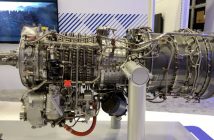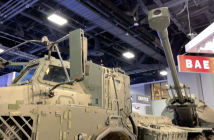Gen. Tod D. Wolters, USAF, NATO’s Supreme Allied Commander and the commander of the US European Command, discusses his priorities, combating Moscow’s disinformation, the recent intercept of Russian aircraft, and the deploy of 1,000 additional troops to Poland with Defense & Aerospace Report Editor Vago Muradian at the 2019 Paris Air Show where our coverage is sponsored by Bell and Leonardo DRS.
Vago Muradian: Welcome to the Defense and Aerospace Report. I’m Vago Muradian here at the Paris Air Show at this historic airfield of Le Bourget outside French capital where our coverage is sponsored by Bell and Leonardo DRS.
It’s our absolute honor to talk to the current Supreme Allied Commander Europe, the Commander of the U.S. European Command, General Tod “Magoo” Wolters. Sir, it’s always an honor and pleasure to talk to you, and congratulations on the new gig.
General Tod D. Wolters: Thank you very much, Vago. It’s always good to be back with you.
Mr. Muradian: I always enjoy our conversations and wanted to start off by asking you about your priorities. There were a lot of folks, it’s certainly an interesting time with Russia, obviously, and I want to ask you about the recent incident that happened in the Baltics. Talk to us a little bit about what your priorities are now that you’re in office after four years as Commander of the U.S. Air Forces Europe and Africa.
Gen. Wolters: Two key issues, Vago. Number one, we have to improve our speed. Physically on the ground, physically in the air, as well as policy. So in making decisions to better deter we want to make them fast and when we have to put folks in uniform to deter we want to make sure they can move out as quickly as they possibly can.
The second part has to do with the stamps. Are the right people in the right place at the right time? And with each and every passing day we’re improving in both of those areas. Those are the two basic priorities we start with.
Mr. Muradian: I want to ask you about disinformation. If you look at it, NATO is a political alliance that delivers military effects, and Russia has realized that the seizing of territory is not going to be a winning proposition, but it can operate just below the threshold of conflict to undermine the alliance, especially with disinformation, deep fake videos. We were at NATO headquarters and had a conversation, several conversations on that issue.
Is this something that’s as devastating as any hypersonic weapon? And ultimately, what’s the right way for even military commanders to be thinking and operating in this space, some of which is aimed at the military commanders to try to undermine their confidence in how they see a situation.
Gen. Wolters: Vago, this is a classic case of making sure you take care of your own backyard. So in all of our training events, in all of our exercise events, we explore activities in the information environment and we make sure that our soldiers, sailors, airmen, marines are ready, willing and able to combat misinformation and to deal with misinformation. It’s an event that is part of each and every one of our exercises.
Mr. Muradian: Let me ask you about the incident that happened just the other day. Two British jets scrambled over the Baltic as Russians came into that region. Talk to us about the incident, what it tells us, but also is it time to shift the air policing mission, as some suggest, to an air defense mission.
Gen. Wolters: We have quick reaction alert aircraft that are involved in the air policing mission. We display vigilance 24x7x365. The event that occurred is not an anomaly. It has happened before.
Here’s the goodness. Our troops are ready, willing and able and trained appropriately to respond quickly. And in that particular case they responded in great fashion and made the conditions very, very safe.
Mr. Muradian: One of your predecessors, Frank Gorenc has talked a lot about setting up an air surveillance, right? We have air policing, but to have an air surveillance mission. Do you think it’s time to try to do that? You’ve talked about the fact that you feel comfortable with the visibility you have, but would a mission like that help?
Gen. Wolters: We’ll continue to explore opportunities to take the air arm of our capabilities in NATO and get the most juice for the squeeze with respect to their ability to contribute in indications and warnings and command and control. And when General Gorenc was taking about improving the air surveillance mission, that’s exactly what he was talking about and we’ll continue to investigate options that maximize our capability to improve our indications and warnings in command and control.
Mr. Muradian: The President recently mentioned a thousand more troops going to Poland. Poland is obviously eager to host allied forces on a more permanent basis, although everybody is going through on a rotational basis. We’ll see whether or not for Trump that comes a reality. But those one thousand troops, where would they be coming from, what would they be doing? Are there forces, as has been suggested, that would come out of Germany? What’s the thinking there? And what’s the benefit and what will those folks be doing?
Gen. Wolters: Those folks will be rotational. Their exact location is still to be determined. But just as the President said, we’ll rotate those troops in on an episodic basis, whether it’s four months at a time, six months at a time is still to be determined, and the precise location as to where they’ll operate is still to be determined.
Mr. Muradian: We are fast approaching or actually we can say we’re in a post INF world. Russia is moving ahead very aggressively with the exact same programs it was moving ahead aggressively before they did this, which is one of the reasons that precipitated our departure from the INF.
As you think about the kind of capabilities the alliance is going to need now that we’re not in the INF, what are the kind of capabilities we need to counter and to address what the Russians are doing?
Gen. Wolters: Vago, first and foremost, Russia violated the INF and we as the United States suspended our involvement. We still have until August, obviously a lot of time between now and August as to what will unfold, but we’ll continue to make sure that we can do all we can do from a training and exercise standpoint to be as ready, willing and able as we can be to appropriately deter if required.
Mr. Muradian: Two questions, quickly. NATO and EUCOM are, Russia has been building up forces again in Crimea. You pay very close attention to that. Is it time to beef up sort of the southern part of the alliance down in that neighborhood?
Gen. Wolters: We’re vigilant, a full 360 degrees on the European continent. We focus on the south, we focus on the southeast. We’ll continue to improve our ability to get indications and warnings and to command and control at a faster pace in all quadrants of the European continent to include the south and southeast.
Mr. Muradian: And let me ask you one final question which is about Turkey. A very, very important NATO partner and ally. A large country in a very important security neighborhood. Turkey has said it’s going to proceed with the S400. The United States has made clear that the F-35 would not go to Turkey at that point. And now there are even broader questions that are being asked about the future of Turkey in the alliance.
What can you tell us on how such an important military contributor to the alliance stays in the alliance and makes sure that the military parts of the relationship remain strong at a very time when there was a lot of political uncertainty and systems uncertainty?
Gen. Wolters: The mil-to-mil relationship that we have with Turkey is as strong as ever. Turkey is an important NATO ally. There’s a Ministerial coming up with the Ministers that represent both nations. They’ll have further conversations and there will be more to follow on this, but yes, you have it exactly right, Vago. We will not collocate the S400 and the F-35.
Mr. Muradian: But does S400 in Turkey change the dynamic even if Turkey does not have, for example, F-35?
Gen. Wolters: As I said, the mil-to-mil relationship with Turkey is as strong as it can be and we’ll continue to work through all these issues. As Secretary General Stoltenberg has said, sometimes inside of a family you have some spats and you have to work through them. We’re going to work through this.
Mr. Muradian: And we didn’t actually plan this, but is that an F-15C over your shoulder?
Gen. Wolters: That is, one of the most gorgeous aircraft in the history of aviation. A fantastic warfighting machine.
Mr. Muradian: And what’s its kill rate?
Gen. Wolters: We won’t talk about that. [Laughter].
Mr. Muradian: General Told Wolters, the Supreme Allied Commander Europe, as well as Commander of U.S. European Command. Sir, it’s an honor and a pleasure and I look forward to seeing you in your neighborhood.
Gen. Wolters: Thank you very much. Look forward to seeing you in about six more months.
30


